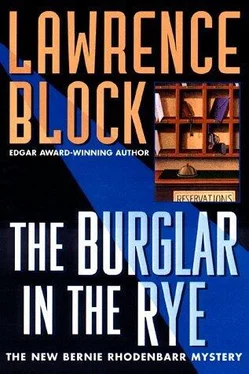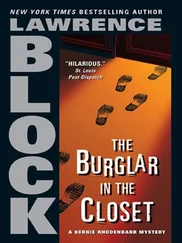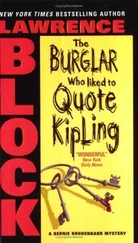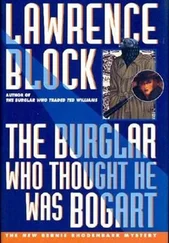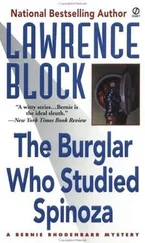“With your clothes and your black bowl.”
“I got a room in the Tenderloin. I put my clothes in the closet and I put the bowl on the dresser. I didn’t recite any poems.”
“You were seventeen.”
“I was seventeen. I was a published writer, and I’d spent three years with a famous novelist who’d given me daily lectures on writing, but I hadn’t written a word since I left Connecticut. And I was still a virgin.”
Coltrane had finished, and what we were listening to now was Chet Baker.
I said, “A virgin. Do you mean that metaphorically or…”
“Literally. Virga intacta, or however it goes in Latin.”
“He, uh, wasn’t interested?”
“He was vitally interested. We had sex just about every day.”
I thought about it. “He’d been to the Amazon,” I suggested, “and he went skinny-dipping and ran into a candiru.”
She shook her head. “No surgery,” she said, “and no performance problems. He just wouldn’t put the usual protrusion into the usual orifice. He did all manner of other things, but the girl who went to San Francisco was still technically a virgin.”
“How come?”
“He never said. Gully wasn’t much on explaining himself. It may have had something to do with my age, or my being a virgin. Or he may have been the same with other women. He may have had a morbid fear of fathering children. Or it may just have been an experiment of his, or a stage he was going through. I tried not to ask questions I sensed he didn’t want to answer. He’d just get this disappointed look on his face, and he’d never answer anyway, so I learned not to ask.”
“So it was something you didn’t talk about.”
“One of many things we didn’t talk about. You get so you take it for granted. And there were plenty of other things we did talk about. And it’s not as though my sexual education was being neglected, because there were plenty of things we did.”
And she commenced to tell me about some of them. She sat a little closer to me on the sofa, and she settled her head on my shoulder and she talked about the things she’d done twenty years ago with a man old enough to be her father.
“Bernie? Where are you going?”
“I’ll be right back,” I told her. “I want to put a record on. I hope you like Mel Tormé.”
“Well,” I said a little later, “you’re not a virgin now.”
“Silly. I stopped being a virgin my second week in San Francisco. And the only reason I lasted that long was that every cute guy I met turned out to be gay.”
“Well, San Francisco.”
She’d stayed in San Francisco for a year and a half, which was how long it took her to write a first draft of a novel. When she was done she set it aside for a week. Then she read it and decided it was terrible. She would have burned it in the fireplace, but she didn’t have a fireplace. Instead she tore it up, tore all the pages in half and then in half again, and let the garbage men take it away.
She’d been supporting herself by waiting tables in a coffeehouse, but she was sick of that, and sick of San Francisco. She moved, San Ildefonso pot and all, to Portland, and then to Seattle. She found a room off Pioneer Square, got a job in a bookstore, and wrote a short story. She sent it to The New Yorker, and when it came back she sent it to Anthea Landau, the only agent she knew of. Fairborn had written to Landau occasionally and got occasional letters from her, sent to him at General Delivery in Santa Fe.
“She sent the story back,” she said, “along with a letter saying it struck her as derivative and unconvincing, though skillfully crafted. And she said she was no longer representing Gulliver Fairborn, and I gathered that mentioning his name might have been a strategic error.”
She reread the story and decided that the agent was right. She tore it up, and a day or two later she came home from the bookstore with a Harlequin romance in her purse. She read it that night, and another the next night, and five more over the weekend. Then she sat down at the typewriter and within a month she had a book written. She sent it directly to the publisher and they sent her a check and a contract.
She used the pen name Melissa Manwaring. The Manwaring came from Nobody’s Baby, of course, and Melissa just seemed to go well with it. She quit her bookstore job when she was halfway through with the second book. Later on she began writing Regency romances for another publisher, with period dialogue and dastardly male characters, and her pen name for these was Virginia Furlong. She changed cities every couple of years, and friends and lovers a little more frequently than that, and she turned out a book often enough that money was never a problem, but not so often that she had to worry about burning out.
Every now and then, say eight or ten times in twenty years, she’d get a purple envelope in the mail with her current address typed on it. And a letter inside from Gulliver Fairborn.
“He wouldn’t have needed to hire detectives,” she said. “I wasn’t hiding from the world the way he was. Each time I moved I sent a change-of-address to the post office. I never paid extra for an unlisted telephone number. Still, he had to make an effort to find me.”
The first letter showed up a few months after Melissa Manwaring’s first novel hit the bookstores. Maybe the pen name caught his eye. In any event, he’d spotted her style right away, and took the time to read the book through and comment on it. That was flattering. He included a return address-General Delivery, Joplin, Missouri, with a false name to address it to. She dashed off a long letter, tore it up, wrote a short one, and sent it off-and heard nothing further, until two years later and a thousand miles away when another purple envelope turned up, this one postmarked Augusta, Maine.
And so it went. She got a letter from him shortly after she was married, and another, two years later, shortly after her divorce. They both kept moving around the country, and occasionally out of it. Their paths never crossed, but she never went more than a couple of years without hearing from him. The purple envelopes always took her by surprise, and she would take them up with a mixture of excitement and dread. He remained, she had to admit, the most important man in her life. Sometimes she cursed him for it, but it was true.
And now, just weeks ago, she’d heard from him after a silence of almost three years.
“Here in New York?”
But no, she’d been living in Charlottesville, Virginia, had moved there in the spring, subletting an apartment a short walk from the University of Virginia campus. She got to share a rose garden with the building’s three other tenants, and she took his letter out to the garden and read it there, on a warm afternoon with a scented breeze blowing.
He was very agitated. That was unusual, as his letters were typically laid-back. What, he wanted to know, had she done with the letters he had sent her? Had she destroyed them? Would she please do so, either that or return them to him?
She wrote back at once, saying that she had kept all of his letters from the very beginning. She traveled light, she kept little, she didn’t even have copies of all of her own books, but she still owned the copy of Nobody’s Baby he’d inscribed to her, and she still had his letters. And she wanted to keep them. Why on earth did he want her to destroy them?
For answer he sent her-by return mail!-a photocopy of an article that had run in the New York Times. Anthea Landau, his erstwhile agent, had made arrangements with Sotheby’s for the sale of all the letters he’d sent her over the years.
He’d called the woman up, outraged, and had made the tactical error of letting phrases like “bloodsucker” and “money-grubbing vampire” and “ten percent of my soul” creep into his conversation. Landau hung up on him and wouldn’t pick up the phone when he called back. He wrote her a letter, arguing his case more diplomatically, stressing that his letters had been written for her eyes only and that it was important to him that he get them back. He offered to pay for them, and invited her to set a price. She wouldn’t have to pay a commission, he said, or report the sale to the IRS, and she would be doing the right thing, too.
Читать дальше
